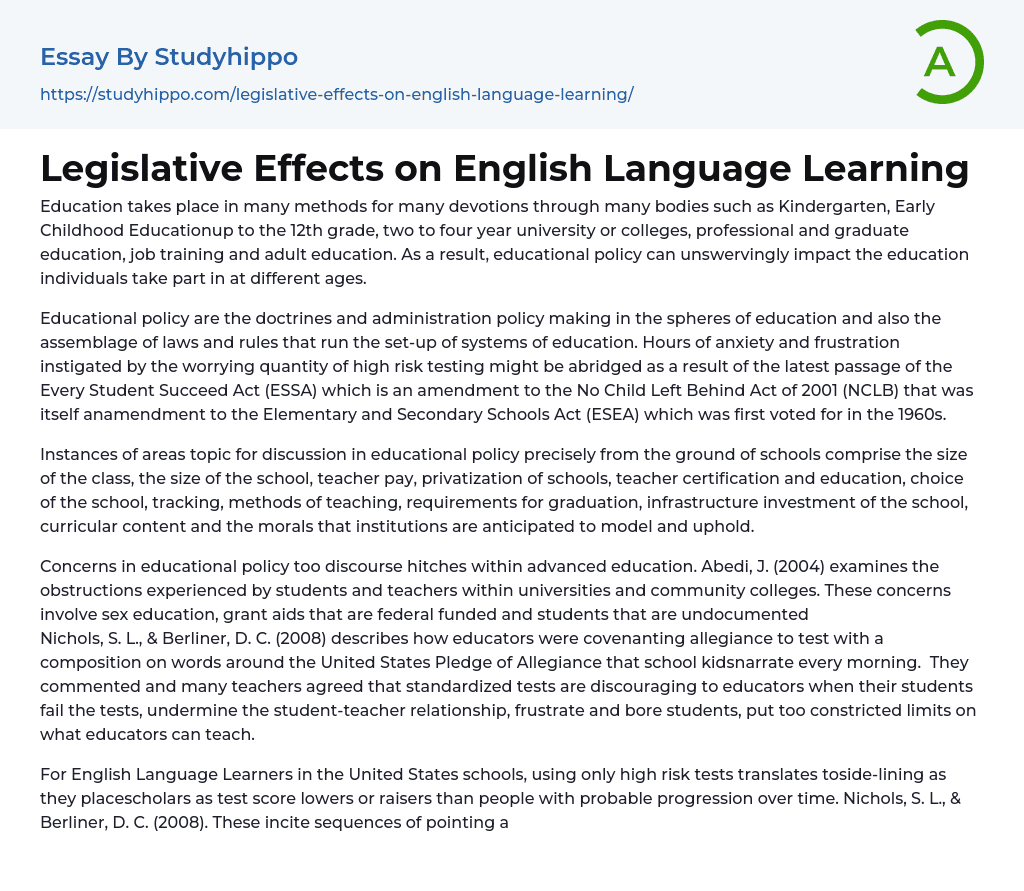

Legislative Effects on English Language Learning Essay Example
Education is facilitated through various means and institutions, encompassing Kindergarten, Early Childhood Education, 12th grade, universities, colleges, professional and graduate schools, job training, and adult education. Therefore, the types of education individuals receive at different stages of life are directly influenced by educational policy.
Educational policy refers to the principles and administrative decisions made in the field of education. It also includes the collection of laws and regulations that govern educational systems.
The Every Student Succeeds Act (ESSA), an amendment to the No Child Left Behind Act of 2001 (NCLB), has helped alleviate some stress and frustration caused by extensive high-stakes testing. The NCLB itself was an amendment to the Elementary and Secondary Schools Act (ESEA) initially enacted in the 1960s.
Educational policy at schools addresses topics such as class size,
school size,
teacher compensation,
school privatization,
teacher certification and training,
school choice,
tracking,
teaching meth
ods,
graduation requirements,
investment in school infrastructure,
curriculum content,
and institutional values.
Abedi, J. (2004) investigates the obstacles encountered by students and teachers in universities and community colleges, specifically in regard to sex education, federally funded grant aids, and undocumented students (Nichols, S. L., & Berliner, D.).
The text discusses how educators express their dissatisfaction with standardized tests by analyzing the words in the United States Pledge of Allegiance, which students recite daily. According to C. (2008), many teachers feel discouraged by these tests because their students' failure reflects negatively on them. Additionally, these tests strain the relationship between students and teachers, leading to frustration and boredom for the students while also limiting what educators can teach. This is especially problematic for English Language Learners in American schools since their performance on these high-stakes exams determines both their academic standing and potential for improvement over tim
(Nichols, S.L., & Berliner, D.).
According to C. (2008), districts and teachers are often blamed for the lack of quality education and support given to students who struggle with understanding the material. Christian, D. et al (2005) pointed out important aspects of the ESSA legislation that include increased state responsibility for English Language Learners, federal support for ELLs, a testing exemption period for new students, mandatory reporting for new and long-term ELLs, alternative assessment methods for improvement, ongoing reporting requirements even after exiting ESL programs, and reporting requirements for ELLs with special needs. These ideas benefit English Language Learners but are not included in the Every Student Succeed Act, which is crucial for L2 educator instructors.
The Every Student Succeeds Act (ESSA) introduces new requirements for educator professional development, but does not offer guidance on improving the expertise of current educators who work with English Language Learners (ELLs). It also lacks recommendations for increasing the number of ESL or bilingual specialists. This suggests that effective teaching alone is considered sufficient when working with ELLs, without striving to implement better or best teaching practices. Furthermore, there is no federal support for the research-supported benefits of multilingual education for both ELLs and English speakers interested in learning other languages. Regrettably, these two aspects are not adequately addressed at a national level.
References
- Nichols, S. L., & Berliner, D. C. (2008). Testing the joy out of learning. Educational Leadership, 65(6), 14-18.
- Genesee, F., Lindholm-Leary, K., Saunders, W., & Christian, D. (2005). English language learners in US schools: An overview of research findings. Journal of Education for Students Placed at Risk, 10(4), 363-385.
The No Child Left Behind Act and its impact on English language learners (ELLs) are analyzed in an article titled "The No Child Left Behind Act and English Language Learners: Assessment and Accountability Issues." This article is featured in the journal Educational Researcher, specifically in volume 33, issue 1, pages 4-14.
- Academia essays
- Higher Education essays
- Language Learning essays
- Studying Business essays
- Education System essays
- Study essays
- First Day of School essays
- Scholarship essays
- Pedagogy essays
- Curriculum essays
- Coursework essays
- Studying Abroad essays
- Philosophy of Education essays
- Purpose of Education essays
- Brainstorming essays
- Educational Goals essays
- Importance Of College Education essays
- Brown V Board of Education essays
- The Importance Of Higher Education essays
- Online Education Vs Traditional Education essays
- Academic And Career Goals essays
- Academic Integrity essays
- Brown Vs Board Of Education essays
- Distance learning essays
- Technology in Education essays
- Vocabulary essays
- Writing Experience essays
- Importance of Education essays
- Early Childhood Education essays
- Academic Degree essays
- Academic Dishonesty essays
- School Uniform essays
- Academic writing essays
- Cheating essays
- Bachelor's Degree essays
- MBA essays
- College Life essays
- Grade essays
- Diploma essays
- Phonology essays
- Sentence essays
- Filipino Language essays
- Pragmatics essays
- Millennium Development Goals essays
- History Of Education essays
- Graduate School essays
- Middle School essays
- School essays
- Special Education essays
- University essays



